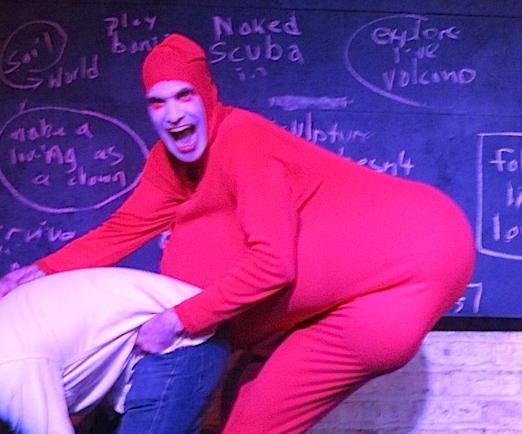Bouffonery and W. Kamau Bell’s stand-up at Stagewerx
Theater history is full of stories of legendary shows that caused riots at their opening night, difficult to imagine in these more apathetic times. We go to the theatre to be entertained, more rarely to be provoked, and more rarely yet, to be stirred to an action greater than the act of merely applauding at the end.
But the theater of Bouffon turns that theater-going complacency on its head. The entertainer in the room is not the curious creature onstage with exaggerated buttocks and an evil smile, but the squirming oddience stuck in the crosshairs of its merciless gaze.
When Eric Davis, a.k.a. the Red Bastard tumbles onto the stage, imitating the slightly baffled faces that gaze up at him in a brilliant, Tourettic flash, a slight tingle of danger vibrates around the room. A dawning awareness, there’s no place to hide. Even those of us who have cleverly ensconced ourselves in the back can tell we’re being scrutinized in the dim lighting of the anonymous warehouse space we’re crammed together in.
“As an audience, you have absolutely no presence,” the Bastard complains. Backs straighten. Chins raise. Challenge us will he? That wobbling, unitard-wearing freak stuffed suggestively with balloons and venom. Of course he will. That’s the whole point.
Red Bastard mocks us. He cajoles. He flirts. He leads the group in a series of physical exercises, dividing the room in two and forcing us to compete, exhorting us to GO BIG. He sticks his bulbous, balloon-stuffed bottom in the face of a pretty girl and makes her dig around for a five-dollar bill. What price dignity. He hocks a loogey onstage and calls it “art” — later he sits in it, “fucking art.” And just at the point where he could become just another one-trick provocateur, he softens the schtick and turns inward. Pressing the buttons of our emotional vulnerability as easily as he pushed our sense of outrage just moments before.
“The more you risk, the more you are rewarded,” he counsels. “If you can’t articulate your desires, you can’t achieve them.” Encouraging the crowd to shout out their deepest desires (“sail around the world,” “naked scuba,” “have a dog,” “fall in love”) he fills an invisible bag with them and pushes it up a “dream mountain” chanting “sissy fuss sissy fuss.”
“What’s difficult about falling in love?” he demands. What’s difficult, he insinuates, about achieving any of our dreams? What indeed.
The ultimate provocation comes when he urges a disgruntled worker bee to call her boss up and quit on the spot, which she gamely attempts but is foiled by the lack of cell phone reception in the room. “T-Mobile,” she explains, as we nod sympathetically. But the seed has been planted, and who knows what fruit it will bear later on.
Then, like the Buddha you kill on the road, Red Bastard sends us away, filled, if only for a moment, with the feeling we truly own our own destiny, a feeling worth every bit of humiliation it took for us to get there.
******
Speaking of owning our own destiny, and following our dreams, local comedian-making-good W. Kamau Bell performed a sold-out weekend at Stagewerx, his spiritual San Francisco home. The theme of much of the show spoke mainly to the heady weirdness of the nature of “celebrity”. Even the kind of ground-level celebrity of having a new television show (Chris Rock-produced Totally Biased on FX) comes with a set of unexpected side effects. Being forced onto The View, auditioning for a spot on The Howard Stern Show, moving to a non-gentrified part of Brooklyn from the Inner Sunset, it’s all fuel for the funny as life’s most awkward moments so frequently are. He’s still the same Kamau, and thank goodness. But the dream, and the comedy, has grown.

